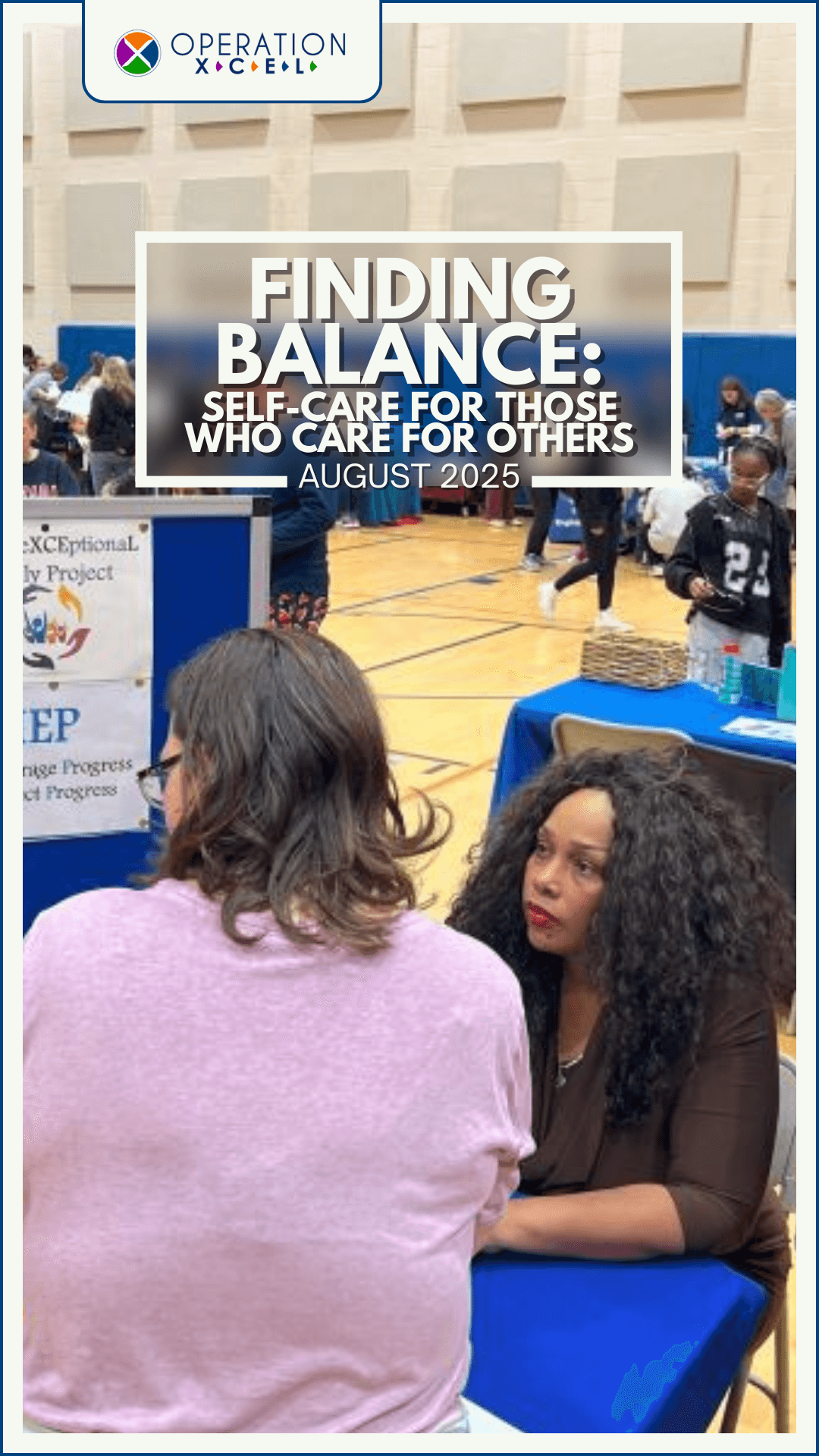
At Operation Xcel, we recognize that caring for students and families—whether as parents, educators, mentors, or coaches—is a profound calling. Yet the emotional, mental, and physical demands of these roles can take their toll. To remain effective, compassionate, and resilient, those who care for others must also care for themselves.
Did you know that Operation Xcel has a Family Engagement Specialist dedicated to helping parents navigate their children's educational experiences? Lori Walton is our Family Engagement Specialist, and I wanted her to share her insights on the importance of self-care. Lori organizes events and conducts personal visits to ensure that every parent feels valued. Lori frequently teaches and promotes the themes of self-care and work-life balance for both parents and staff.
When I asked Lori why self-care matters, she responded:
[After my sweet boy, Promise Soul, was diagnosed with Autism at age 3, I had to set both priorities and boundaries to sustain my sanity, poise, and purpose. I had to eliminate and reschedule the demands of the people, places, and things that failed to even pencil me in! I went on a constant mission to stop adjusting my thermostat to fit in rooms that drained me and depleted me. I read books, affirmations, prayed, confided in trusted ears, and braved the storm. Why? Because self-care is the act of preserving your energy for a greater purpose and a greater good. You are that greater good and precious purpose!
As parents, life will attract a wide variety of challenges. The arduous task of balancing it all can be daunting; yet it can become lighter as you make a conscious effort to make space for yourself. Self-care is self-maintenance. It is a constant self-inventory of the people and demands in your life that cost you more than they contribute to you. It is an elimination of roles that never had a script for you. Self-care is putting yourself at the center of responsibility while remaining centered for “those” you are tasked to love and to nurture. It is an understanding that you are an integral part of “those” and that being selfish is not being selfless.
Self-care is survival. It is self-preservation and a guilt-free approach to setting boundaries. It is the realization that boundaries are not about being cold but about being clear. Oftentimes, parents naturally lose their identity in the day-to-day rearing of their children, which can become a silent journey and a direct conduit to the land of “loss of self.” Although typical, it is not a healthy habit. Because we know that healthy parents are more equipped to create healthy children.
Parents must learn to be “ok” with the notion that over-compromising themselves is an inevitable eviction notice for their identity. The solution? Devoting a part of each day to yourself. This must be a non-negotiable sacrifice and indulgence with the realization that overextending can lead to bankruptcy.
Self-care is positioning yourself to be an architect, not an arsonist. Keeping your flame lit without burning yourself! Simply start somewhere and build. Today, treat yourself to an ice-cream cone. The following week, dust off and pick up the book you set aside months ago and aim to complete it! Pick up the phone and call an old friend who makes you laugh until you become breathless. Take time to forget about time and be fine with that. Putting an expiration date on the futile task of devoting your sweet energy to resuscitating relationships that were only breathing because of your effort. Self-care is possible, but it requires space. A space that only you can provide. Find space to let it breathe, grow, and protect it there with vengeance. Contract with that new space. Constantly lowering your place on your priority list will not strengthen any connection in your life. But it will certainly block your evolution. Now, go…have an ice-cream cone!!!]
Isn’t Lori’s perspective on self-care inspiring? Now, let’s see what psychologists and social researchers have to say about self-care. You may notice some similarities with Lori’s viewpoint. These parallels are coincidental, as Lori did not have access to this information before writing her response.
- Sustaining Your Energy
Self-care isn’t selfish. It replenishes your emotional and physical resources, so you can continue showing up fully. As noted in Psychology Today, self-care helps caregivers remain “present, regulated, and well-resourced”—ensuring they can model healthy coping for young people Psychology Today. - Reducing Stress and Burnout
Research consistently shows that high caregiving demands lead to elevated stress levels, emotional exhaustion, and in extreme cases, serious health issues. Studies on dementia caregivers, for instance, find that mindfulness-based practices can significantly reduce stress, anxiety, and depression—highlighting the power of gentle, consistent self-care interventions PubMed Central+1PubMed. - Supporting Children’s Well-Being
Elevated parental stress not only affects caregivers—it can impair children’s emotional regulation, academic achievement, and behavior. Stress in parents correlates with higher cortisol levels and greater risk of behavioral and developmental challenges in kids Children’s Health.
Self-Care Tips with Evidence-Based Backing
- Set Healthy Boundaries ⏰
Saying “no” to overcommitment protects your capacity to say “yes” where it matters most—without risking burnout Psychology Today. - Prioritize Rest
Sleep supports emotional regulation and mental clarity. Regular rest is foundational for sustained caregiving. - Engage in Small Moments of Joy
Brief self-care acts—like a quiet walk, journaling, or listening to music—can lower stress and uplift mood Adelaide NowParents. - Practice Mindfulness or Meditation
Even a few minutes of mindfulness has been shown to improve stress and workplace well-being, making it a practical tool for busy caregivers Psychology Today. - Connect with Others
Sharing experiences with trusted friends or colleagues not only eases emotional burden—it strengthens resilience. - Ask for Help and Use Support Resources
Accepting support—whether via respite care, peer groups, or community programs—can significantly reduce emotional and physical strain Psychology Online.
The Ripple Effect of Self-Care
When caregivers prioritize self-care, they benefit—but so do the young lives they shape. Resilient caregivers foster confident, engaged, and emotionally stable children. This creates a virtuous cycle of care: you care for yourself so you can care for others…who then feel supported to care in their own turns.
Final Thought
To every parent, educator, mentor, coach, and community supporter reading this: you matter, and so does your well-being. Small, consistent acts of self-care are not indulgences; they are investments in your strength, presence, and the futures of the children you uplift. We encourage you to stop procrastinating when it comes to taking care of yourself. Be intentional about following the advice that every flight attendant gives passengers: put on your own mask before assisting anyone else.
Self-care can be as simple as taking a 15-minute nap. Every small step you take helps you recognize that you matter! You are important, and you deserve it!

